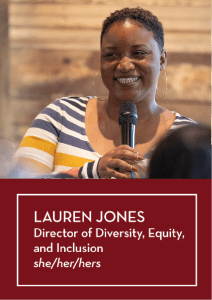Originally published in the February 2023 issue of the Notes on Antiracism, Justice, and Equity newsletter.
After the murder of George Floyd and several other Black people across our nation in 2020, Minneapolis, Hennepin County, the Minnesota House, and hundreds of cities, counties, and governmental leaders across the nation declared racism a public health crisis. By publicly recognizing that more than 400 years of forced labor, exclusion, and oppression continue to have a negative impact on those racialized as Black, these important entities added strength to our own antiracist efforts.
 Our school has made the commitment to identify and dismantle racism and white supremacy, and our everyday interactions help us to gauge where there has been movement toward those goals. Our biennial climate assessment, which we launched in fall 2020, helps to supplement and quantify that knowledge.
Our school has made the commitment to identify and dismantle racism and white supremacy, and our everyday interactions help us to gauge where there has been movement toward those goals. Our biennial climate assessment, which we launched in fall 2020, helps to supplement and quantify that knowledge.
Nearly 400 School of Public Health (SPH) faculty, staff, students, and alumni responded to the first climate assessment, which served as a baseline analysis of our climate. One of our goals is to help marginalized students and employees learn and thrive in the safest environment possible, so we placed a great emphasis on gauging our climate for Black, Indigenous, people of color (BIPOC), and American Indian people.
Since 2021, when SPH launched its Strategic Plan for Antiracism (SPAR), our school’s Office of Diversity, Equity, and Inclusion (DEI) has led and supported a broad array of initiatives to support the plan, including conducting training, hosting guest speakers, and managing affinity groups. Every area of the school is integral to SPAR’s progress and the DEI office continues to work with SPH leaders to implement changes in daily operations.
Last October, our school conducted the second biennial climate assessment, working with the U of M Office of Measurement Services to maintain the highest standards of confidentiality in both data collection and analysis. We made a few changes in the 2022 assessment, including using only the survey to test the climate, not focus groups or interviews; rewording several questions for more accurate responses; and adding questions about antiracism. Except for these changes, the survey was largely the same as that in 2020.
While the full report will be released later this month, we are cautiously optimistic about the results so far, specifically around how BIPOC and American Indian people perceive the school’s culture and progress. Fewer people reported witnessing or experiencing microaggressions, and more people reported that they felt that their opinions were valued. We will share more insights about the 2022 climate assessment results in next week’s community forum, and we highly encourage all SPH community members to attend.
Even with some encouraging responses in the assessment, we recognize that organizational change takes a tremendous amount of time and energy. Two years is a miniscule timeframe in which to create what we hope to achieve. We hope that all of you will remain committed and engaged in this process.
Toward justice,
Lauren Jones
Director, Diversity, Equity, and Inclusion
UMN School of Public Health
she/her/hers
—
Sign up to receive the monthly Notes on Antiracism, Justice, and Equity newsletter.
